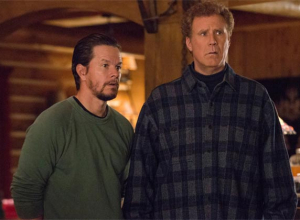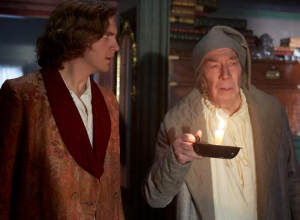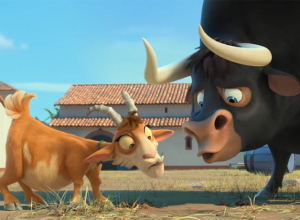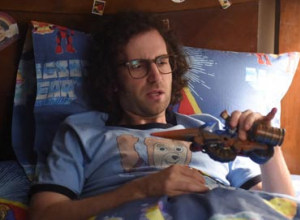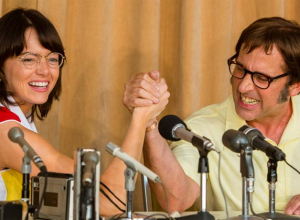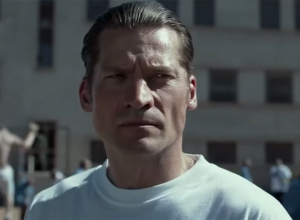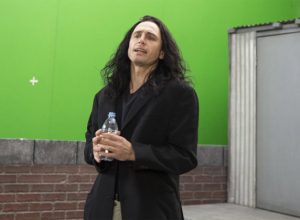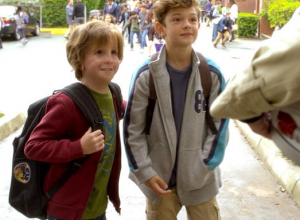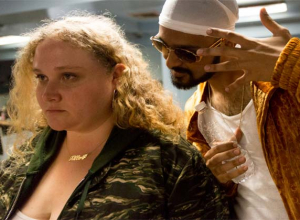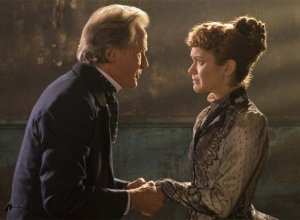Slacker Review
By Christopher Null
I lived in Austin when Slacker was made in 1991 -- I was a junior at The University of Texas at the time, not cool enough to personally know anyone involved with the production but certainly aware of it when it came out. You couldn't avoid it: The film earned a miniscule release and was ignored at the national level, but in the town of Austin (population about 800,000 at the time), it got the red carpet treatement, playing in local theaters all year long.
The phenomenon had only a little to do with the setting -- from the school campus to dozens of favorite local haunts, everyone had a story about "eating in that restaurant" or "living in that house" (Austin is a very moving-friendly community). But more importantly, everyone in Austin was represented on screen somewhere. With a cast of 90 or so speaking parts, that's meant literally, to some extent: The film is packed with local celebrities and wannabes, from director Richard Linklater himself to one-hit wonder Abra Moore to notorious blowhard/poet Wammo, most of whom play thinly-veiled variations on themselves. But the movie's also stuffed to the gills with the archetypal kooks that make Austin so unique: Pontificating perma-grad students, anarchists, drunks, conspiracists, shysters, feminists, rednecks, musicians, collectors of oddities, thieves, car fanatics, and just plain eccentrics -- all unified not only by the fact that they live in Austin, but that they're all pretty much dead broke. (This is a phenomenon that continues to this day: Most everyone who stays in town ends up living in one poorly air-conditioned hovel or another until he finally breaks down and leaves.)
At this point you may be wondering what the movie's actually, you know, about. The answer: Nothing. Nothing at all. Linklater's structure is so jaw-droppingly unique that you probably won't believe he's really going to do it for the entire film. And yet he does: For 97 minutes, Linklater follows a procession of characters one after another -- none is on screen for more than a few minutes. One guy walks down the street talking about moon landing conspiracies, when he passes a brunette woman, the camera starts following her, forgetting the entire moonie line of thought. The stories aren't related, and only a few of them are substantive in any way (the most enlightened is UT philosophy professor Louis Mackey, who talks about Poland, anarchy, and his disappointment at not being around when Charles Whitman shot and killed 14 people from UT's famed tower in 1966). This filmmaking conceit has been ripped off by dozens of imitators in the following years, none of which have been particularly successful. Many of these continue to come out of Austin, where locals seem to think an indie film community is thriving. (Sorry guys, it ain't.) Notably, the film inspired Clerks, which just came out on a big-package DVD as well.
That's not to say that the rest of the film is without merit. Slacker is actually at its most fun when people are riffing about random nonsense -- most memorably two cafe patrons arguing that The Smurfs is born from Krishna mythology and the famous scene with Teresa Taylor (that's her on the box cover) hawking a supposed Madonna pap smear for rent money. Some of the bits don't work -- at all -- and around the 75-minute mark, this all tends to wear a little thin. The entire film takes place during one day in Austin, with a break for sleep as it picks up again in the morning. For some reason, once it gets dark, Slacker loses steam until its smashing finale suddenly appears.
As a film, Slacker is solid, low-budget moviemaking. Shot on 16mm, Linklater proved from the start that he knew his way around a camera and could tell an interesting tale in 60 seconds, too. He's clearly a master of the long shot, above all else. Looking back at Slacker after 13 years, it's still fascinating and fun to watch -- though my enjoyment is probably now filtered more through nostalgia than anything else. While the march of progress has yet to effect Austin's collective consciousness, it has all but razed the character of the city. Landmarks like Quackenbush's and Les Amis are long gone, replaced with McDonalds and Starbucks. Empty skyscrapers dot the town, which was savaged during the dot-com fallout. Austin, which sits in the shadow of Dell Computer, had fashioned itself a high-tech mecca, and it didn't really take. Slacker's semi-celebs are still doing the same old shit -- or have faded into obscurity. Louis Black still edits the local alt-weekly, and the same local crazies still write the same crazy letters to him. Wammo's online diary was last updated eight months ago. Musicians like Jean Caffeine and Ed Hall haven't put out albums in years.
All my other friends in Austin are still doing the same stuff they were doing when I left in 1996. They go to the same bars, the same restaurants, the same jobs. Life in Austin is almost a time capsule despite the changes in scenery. Watching Slacker makes me homesick, but not for the Austin of today. I'd love to return to the Austin of 1991, when the city was so full of hope. At the time, it seemed like you could do anything -- and Slacker's success was full of that promise, the way sex, lies, and videotape invigorated the indie filmmaking scene in the 1980s. The problem, it turns out, is that while maybe you could do anything, you'd probably still be doing it today.
Criterion, God love 'em, has put Slacker on DVD at last, and the two-disc set is a doozy. Three commentary tracks are on offer from Linklater and a variety of cast and crew members (proof that Austin doesn't change: all these people are still hanging around). Casting sessions, treatments, home movies, and a trailer for a documentary about one of the locations in the film (the Les Amis cafe) and in a broader sense about the homogenization of Austin also appear on disc one. About half an hour of deleted scenes show that Slacker's stories were once far more interlocking than in the final cut. The second disc includes Linklater's first movie (Slacker was his first), It's Impossible to Learn to Plow by Reading Books, plus various short films, extra footage, scripts, and umpteen zillion other features. If you manage to get through all of this, trust me, you're no slacker.
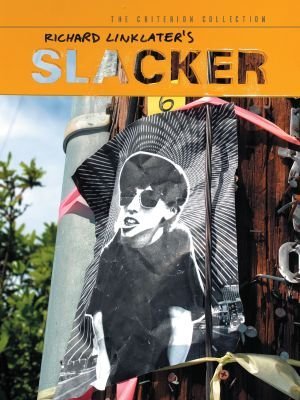
Facts and Figures
Year: 1991
Run time: 97 mins
In Theaters: Friday 5th July 1991
Distributed by: The Criterion Collection
Reviews
Contactmusic.com: 4.5 / 5
Rotten Tomatoes: 85%
Fresh: 28 Rotten: 5
IMDB: 7.1 / 10
Cast & Crew
Director: Richard Linklater
Producer: Richard Linklater
Screenwriter: Richard Linklater
Starring: Richard Linklater as Should Have Stayed at Bus Station
Also starring: Rudy Basquez, Jean Caffeine, Jan Hockey, Stephan Hockey, Samuel Dietert, Bob Boyd, Terrence Kirk, Keith McCormack, Jennifer Schaudies, Dan Kratochvil, Maris Strautmanis, Brecht Andersch, Tommy Pallotta, Jerry Delony, Heather West, John Spath, Ron Marks, Daniel Dugan, Brian Crockett, Scott Marcus, Stella Weir, Teresa Taylor, Mark Harris, Greg Wilson, Deborah Pastor, Gina Lalli, Sharon Roos, Frank Orrall, Abra Moore, Lori Capp, Gus Vayas, Louis Black, Don Stroud, Janelle Coolich, Aleister Barron, Albans Benchoff, Nigel Benchoff, Zara Barron, Kevin Whitley, Steven Anderson, Robert Pierson, Sarah Harmon, David Haymond, John Slate, Scott Van Horn, Lee Daniel, Charles Gunning, Tamsy Ringler, Luke Savisky, Meg Brennan, Phillip Hostak, Shelly Kristaponis, Louis Mackey, Kathy McCarty, Michael Laird, Jack Meredith, Clark Walker, Kalman Spelletich, Siqgouri Wilkovich, John Hawkins, Scott Rhodes, Mimi Vitetta, Susannah Simone, Bruce Hughes, Keith Fletcher, Eric Buehlman, Mark Quirk, Kim Krizan, Annick Souhami, Regina Garza, Stephen Jacobson, Eric Lord, Kelly Linn, Rachael Reinhardt, Stewart Bennet, Kevin Thomson, Nick Maffel, Nolan Morrison, Kyle Rosenblad, Ed Hall, Lucinda Scott, Marianne Hyatt, Gary Price, Joseph Jones, Kendall Smith, Sean Coffey, Jennifer Carrol, Charlotte Norris, Patrice Sullivan, Greg Ward

